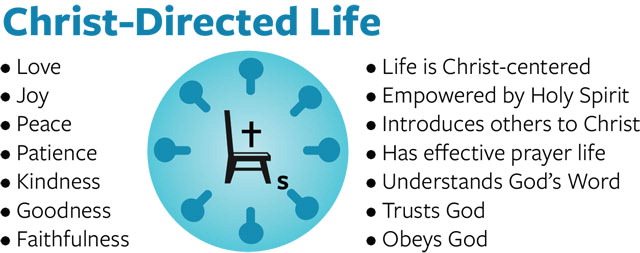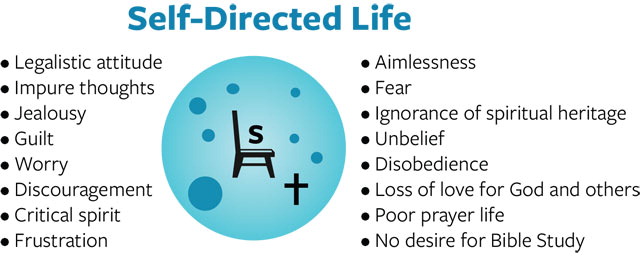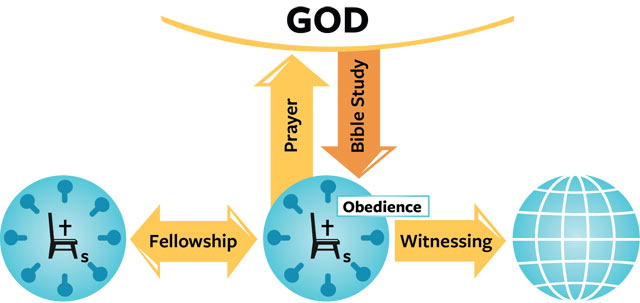Step 1: The Christian Adventure
The Christian’s Certainty
Believers of the Old Testament times looked forward to the coming of their Messiah. New Testament believers look back to the cross and the resurrection. Both of these events culminate in the unique person of Jesus Christ. The apostle Paul says, “It was through what His Son did that God cleared a path for everything to come to Him — all things in Heaven and on Earth — for Christ’s death on the cross has made peace with God for all by His blood…and now as a result Christ has brought you into the very presence of God, and you are standing there before Him with nothing left against you…the only condition is that you fully believe the Truth, standing in it steadfast and firm, strong in the Lord, convinced of the Good News that Jesus died for you, and never shifting from trusting Him to save you.” (Colossians 1:20-23)
Hundreds of millions of people around the world have discovered this marvelous “path” because of Jesus’ death on the cross and His bodily resurrection from the dead.
Jesus’ death bridged the gulf between the holiness of God and the sinfulness of man. He died to pay the penalty of our sin and rescue us “out of the darkness and glood of Satan’s kingdom” and bring us “into the Kingdom of His dear Son, who bought out freedom with His blood and forgave us all our sins.” (Colossians 1:13-14) But without His resurrection and ascension, His sacrifice would have been incomplete, and we would have remained under the penalty of death. (I Corinthians 15:17)
To believe in Jesus Christ as the Savior of the world is to believe in a living person. People often ask, “What is the meaning of belief?” The Amplified New Testamentexpresses the full meaning of the term believe as “adhere to, trust in, and rely on.” The Gospel of John has been called the Gospel of Belief. The word believe occurs many times in the book of John. Chapter 20, verse 31, expresses the purpose of that book:
“These are written that you may believe that Jesus is the Christ, the Son of God, and that by believing, you may have life in His name.”
The living Savior, therefore, is the basis for Christian confidence. The resurrection is the foundation of our certainty that we have eternal life and that we experience daily the indwelling presence of our loving Savior.
The printed version of this study contains 9 pages of prepatory study notes not included in this online version. Click here to order the complete study guide, The Christian Adventure.
Christian Certainty
The apostle Paul says, “It was through what His Son did that God cleared a path for everything to come to Him — all things in Heaven and on Earth — for Christ’s death on the cross has made peace with God for all by His blood…and now as a result Christ has brought you into the very presence of God, and you are standing there before Him with nothing left against you…the only condition is that you fully believe the Truth, standing in it steadfast and firm, strong in the Lord, convinced of the Good News that Jesus died for you, and never shifting from trusting Him to save you.” (Colossians 1:20-23)
Hundreds of millions of people around the world have discovered this marvelous “path” because of Jesus’ death on the cross and His bodily resurrection from the dead.
Jesus’ death bridged the gulf between the holiness of God and the sinfulness of man. He died to pay the penalty of our sin and rescue us “out of the darkness and glood of Satan’s kingdom” and bring us “into the Kingdom of His dear Son, who bought out freedom with His blood and forgave us all our sins.” (Colossians 1:13-14) But without His resurrection and ascension, His sacrifice would have been incomplete, and we would have remained under the penalty of death. (I Corinthians 15:17)
To believe in Jesus Christ as the Savior of the world is to believe in a living person. People often ask, “What is the meaning of belief?” The Amplified New Testamentexpresses the full meaning of the term believe as “adhere to, trust in, and rely on.” The Gospel of John has been called the Gospel of Belief. The word believe occurs many times in the book of John. Chapter 20, verse 31, expresses the purpose of that book:
“These are written that you may believe that Jesus is the Christ, the Son of God, and that by believing, you may have life in His name.”
The living Savior, therefore, is the basis for Christian confidence. The resurrection is the foundation of our certainty that we have eternal life and that we experience daily the indwelling presence of our loving Savior.
The printed version of this study contains 9 pages of prepatory study notes not included in this online version. Click here to order the complete study guide, The Christian Adventure.
Christian Certainty
- What must one do to become a Christian? (John 1:12)
- To be a son of God is to be born of whom? (John 1:13)
- To believe in Jesus Christ is to possess and be free from what? (John 5:24)
- What did Christ do with our sins? How should this affect our lives? (I Peter 2:24-25)
- What three things characterize Jesus’ sheep? (John 10:27)
- What is your relationship with Christ, as He Himself states in John 10:18-30?
- What are the implications of failing to believe the testimony that God has given regarding His Son? (I John 5:10-11)
- The resurrection of Jesus is history’s most revolutionary event. How does it prove Christ’s claim to be God? (Romans 1:4)
- Why is the resurrection so essential to our faith? (I Corinthians 15:17, Ephesians 2:4-10)
- In John 3:3-7 what did Jesus tell Nicodemus about seeing and entering the Kingdom of God?
- At physical birth one receives many things he is not aware of: family name, privileges, wealth, love, care, and protection. At spiritual birth one becomes a son of God and receives eternal life, a divine inheritance, and God’s love, care, and protection. God has given us these because of His great love. God’s gifts are never based on man’s changing emotions, but on His own unchanging word. In your own words, describe what you have, according to these verses: Ephesians 1:7, Romans 5:1, Romans 3:22, Colossians 1:27.
- As you begin to live the Christian life, what three evidences in your life will assure you that you know Jesus Christ? (I John 2:3, I John3:14, Romans 8:16)
- Who is Jesus Christ to you?
- What is your relationship with God?
- What kind of life do you now possess?
- What about your sins?
- Why are you sure (or doubtful) of your salvation?
- What changes do you believe have taken place because of Christ in your life?
The Christ Controlled Life
There is a throne, a control center — the intersection of one’s intellect, emotions, and will — in every life. Either self or Christ is on that throne. Let me illustrate. I like to plan as far in advance as possible, especially for key events. But occasionally I get so busy with the many details of our worldwide ministry that an important item slips through. With a key conference only a couple of weeks away, I had realized the need for a set of printed materials that would be of tremendous benefit to the attendees.
As I shard the urgency with the department director responsible for this need, he responded, “Bill, we’re full up already. Two weeks just isn’t enough time.”
I became impatient. Couldn’t my associate see that we are in a war for men’s souls, that we must seize opportunities when they arise and not limit our efforts to 8-to-5 workdays? I made my point clear to him.
“But if we had more notice…,” he protested. “There just is no way we can squeeze in such a huge job with so little time. There’s the writing, then the design, typesetting, and artwork, then the printing…”
It seemed obvious that he did not share my burden for the upcoming event. I pressed my point. “Look, this is an important international conference,” I said firmly, my voice rising. “And this is no time for ‘business as usual.’ Please find a way to finish this project in time for the conference, even if you have to work around the clock.”
I could tell that my colleague was frustrated. But I reasoned, We need those printed materials. Whatever it takes, we need them.
Within a few moments after our conversation, I sensed the conviction of the Holy Spirit. Yes, even in our well-intended service of the Lord, we can stumble — and in the name of godliness I had offended a dear brother in Christ. I had failed to give him and his staff the benefit of the doubt — failed to take into account the tough workload they already were facing each day.
Instead of asking him to think through the possibilities with me and helping him rearrange his priorities to accommodate the new task, I had virtually ordered him to get the project done and shown little appreciation for the many late evenings his team was already devoting to their work. I had reacted impatiently rather than in a spirit of love, understanding, and teamwork.
At this point I had a choice to make.
On the one hand, I could let it go. After all, doesn’t the head of a large organization have the right to ramrod projects through when necessary? Didn’t the end (the strategic international conference) justify the means (get the job done no matter what it takes)? And didn’t my associate’s hesitant attitude warrant a stern talking-to about the urgency of the hour?
By all human standards, I probably could have justified letting the incident go. But deep inside I would have been restless and uncomfortable as the Holy Spirit continued to point out my sin to me, and God would not have blessed my efforts on His behalf as long as this sin remained unconfessed. On top of that, several of my dear co-workers would have continued to hurt as a result of my callous attitude.
On the other hand, I could deal with the problem by taking scriptural action to clear the slate. The unrest in my conscience was the Holy Spirit cross-examining me as I tried to rationalize my behavior. What I had thought was forceful leadership, He was identifying as the signs of impatience and unjustifiable anger.
I knew that taking scriptural action was the only choice I could make that would please my Lord. I confessed my sin to Him and appropriated His forgiveness.
Then came the toughest part.
I drove down to the office complex where my associate and his team were located and asked their forgiveness. We cried and laughed and prayed together, sensing a fresh outpouring of God’s love in our midst. Then we talked through our mutual needs and found a way — as teammates — to rearrange priorities and accomplish the task — on time!
That is what the Christian life is all about — just keeping Christ on the throne. You do this when you understand how to walk in the control and power of the Holy Spirit, for the Holy Spirit came for the express purpose of glorifying Christ by enabling the believer to live a holy life and to be a fruitful witness for our dear Savior.
Many people have misconceptions about the Christian life. Some argue that once they have received Jesus Christ into their lives by faith, it is up to them to live a life pleasing to God in their own strength. Others believe that Christ has entered their lives to help them live and work for God’s glory. These ideas of Christian living look good on the surface, but each contains a weakness that actually undermines the basis of vital Christian living.
In light of Romans 7:18, Galatians 2:20, and Romans 1:17, what do you think the basic approach should be?
Someone said, “The Christian life is not difficult — it is impossible.” Only one person has ever lived the Christian life, and that was Jesus Christ. Today He desires to go on living His life through Christians whom He indwells. J.B. Phillips, in the preface to his translation of a portion of the New Testament, Letters to Young Churches, said:
“The great difference between present-day Christianity and that of which we read in these letters is that to us it is primarily a performance, while to them it was a real experience. We are apt to reduce the Christian religion to a code, or at best a rule of heart and life. To those men it is quite plainly the invasion of their lives by a new quality of life altogether. They do not hesitate to describe this as Christ “living” in them.
Before His death, Christ told His disciples that it was best for Him to leave them so that the Spirit of God might come to dwell in each of them (John 14:16-20, 16:7). In other words, Christ was physically departing from His disciples so that He might always be present spiritually within each of them.
Today when a person places his faith in Christ, Christ comes to dwell within him by means of the Holy Spirit (Romans 8:9). His purpose for dwelling in us is that He might live His life through us. Many Christians are trying to operate on their own finite ability instead of Christ’s infinite power.
Have you ever asked yourself, How can I experience the victorious life of Christ? To find the answer, let’s examine the three types of persons in the world today: the non-Christian (natural man), the spiritual Christian, and the worldly or carnal Christian.
The Non-Christian or Natural Man
Why are many Christians not filled with the Holy Spirit?
In the following diagram, this circle represents the life of the person who has never received Christ as Savior and Lord. Christ stands outside the door of the life, seeking entrance. (Revelation 3:20)
I like to plan as far in advance as possible, especially for key events. But occasionally I get so busy with the many details of our worldwide ministry that an important item slips through. With a key conference only a couple of weeks away, I had realized the need for a set of printed materials that would be of tremendous benefit to the attendees.
As I shard the urgency with the department director responsible for this need, he responded, “Bill, we’re full up already. Two weeks just isn’t enough time.”
I became impatient. Couldn’t my associate see that we are in a war for men’s souls, that we must seize opportunities when they arise and not limit our efforts to 8-to-5 workdays? I made my point clear to him.
“But if we had more notice…,” he protested. “There just is no way we can squeeze in such a huge job with so little time. There’s the writing, then the design, typesetting, and artwork, then the printing…”
It seemed obvious that he did not share my burden for the upcoming event. I pressed my point. “Look, this is an important international conference,” I said firmly, my voice rising. “And this is no time for ‘business as usual.’ Please find a way to finish this project in time for the conference, even if you have to work around the clock.”
I could tell that my colleague was frustrated. But I reasoned, We need those printed materials. Whatever it takes, we need them.
Within a few moments after our conversation, I sensed the conviction of the Holy Spirit. Yes, even in our well-intended service of the Lord, we can stumble — and in the name of godliness I had offended a dear brother in Christ. I had failed to give him and his staff the benefit of the doubt — failed to take into account the tough workload they already were facing each day.
Instead of asking him to think through the possibilities with me and helping him rearrange his priorities to accommodate the new task, I had virtually ordered him to get the project done and shown little appreciation for the many late evenings his team was already devoting to their work. I had reacted impatiently rather than in a spirit of love, understanding, and teamwork.
At this point I had a choice to make.
On the one hand, I could let it go. After all, doesn’t the head of a large organization have the right to ramrod projects through when necessary? Didn’t the end (the strategic international conference) justify the means (get the job done no matter what it takes)? And didn’t my associate’s hesitant attitude warrant a stern talking-to about the urgency of the hour?
By all human standards, I probably could have justified letting the incident go. But deep inside I would have been restless and uncomfortable as the Holy Spirit continued to point out my sin to me, and God would not have blessed my efforts on His behalf as long as this sin remained unconfessed. On top of that, several of my dear co-workers would have continued to hurt as a result of my callous attitude.
On the other hand, I could deal with the problem by taking scriptural action to clear the slate. The unrest in my conscience was the Holy Spirit cross-examining me as I tried to rationalize my behavior. What I had thought was forceful leadership, He was identifying as the signs of impatience and unjustifiable anger.
I knew that taking scriptural action was the only choice I could make that would please my Lord. I confessed my sin to Him and appropriated His forgiveness.
Then came the toughest part.
I drove down to the office complex where my associate and his team were located and asked their forgiveness. We cried and laughed and prayed together, sensing a fresh outpouring of God’s love in our midst. Then we talked through our mutual needs and found a way — as teammates — to rearrange priorities and accomplish the task — on time!
That is what the Christian life is all about — just keeping Christ on the throne. You do this when you understand how to walk in the control and power of the Holy Spirit, for the Holy Spirit came for the express purpose of glorifying Christ by enabling the believer to live a holy life and to be a fruitful witness for our dear Savior.
Many people have misconceptions about the Christian life. Some argue that once they have received Jesus Christ into their lives by faith, it is up to them to live a life pleasing to God in their own strength. Others believe that Christ has entered their lives to help them live and work for God’s glory. These ideas of Christian living look good on the surface, but each contains a weakness that actually undermines the basis of vital Christian living.
In light of Romans 7:18, Galatians 2:20, and Romans 1:17, what do you think the basic approach should be?
Someone said, “The Christian life is not difficult — it is impossible.” Only one person has ever lived the Christian life, and that was Jesus Christ. Today He desires to go on living His life through Christians whom He indwells. J.B. Phillips, in the preface to his translation of a portion of the New Testament, Letters to Young Churches, said:
“The great difference between present-day Christianity and that of which we read in these letters is that to us it is primarily a performance, while to them it was a real experience. We are apt to reduce the Christian religion to a code, or at best a rule of heart and life. To those men it is quite plainly the invasion of their lives by a new quality of life altogether. They do not hesitate to describe this as Christ “living” in them.
Before His death, Christ told His disciples that it was best for Him to leave them so that the Spirit of God might come to dwell in each of them (John 14:16-20, 16:7). In other words, Christ was physically departing from His disciples so that He might always be present spiritually within each of them.
Today when a person places his faith in Christ, Christ comes to dwell within him by means of the Holy Spirit (Romans 8:9). His purpose for dwelling in us is that He might live His life through us. Many Christians are trying to operate on their own finite ability instead of Christ’s infinite power.
Have you ever asked yourself, How can I experience the victorious life of Christ? To find the answer, let’s examine the three types of persons in the world today: the non-Christian (natural man), the spiritual Christian, and the worldly or carnal Christian.
The Non-Christian or Natural Man
Why are many Christians not filled with the Holy Spirit?
In the following diagram, this circle represents the life of the person who has never received Christ as Savior and Lord. Christ stands outside the door of the life, seeking entrance. (Revelation 3:20)

- What adjective do you think best describes the man who does not understand the things of the Spirit of God? (I Corinthians 2:14)
- What terms describe self in the following verses? (Romans 6:6, Galatians 5:16-17)
- List at least three characteristics of the man without Christ, as described in Ephesians 2:1-3.
- What is the condition of the heart of the natural man? (Jeremiah 17:9)
- List the thirteen sins that Jesus said come from the heart of man. (Mark 7:20-23)
- Summarize the relationship between God and the non-Christian. (John 3:36)
- How, then, does one become a Christian? (John 1:12, Revelation 3:20)

- What are some other characteristics of a life controlled by God’s Spirit? (Romans 6:6)
- In what sense could the Spirit-controlled life be called the exchanged life? (Galatians 2:20 )
- Where does the Christian receive the power to live this otherwise impossible life? (Philippians 4:13 )
- What does the spiritual Christian have that will enable him to understand the things of God? (I Corinthians 2:14-16)

- Describe the worldly Christian as presented in I Corinthians 3:1-3.Name five or six practices that result from worldliness. (Galatians 5:19-20)Summarize in your own words the relationship between the worldly mind and God, as described in Romans 8:7.
- The solution to worldliness (the self-controlled life) is threefold. We must confess our sins, recognizing that we have been rulers of our own lives. When we confess them, what will God do? (I John 1:9)
- In prayer, examine your attitude. Do you honestly want Christ to control your life? If not, ask God to change your heart. Thank Him, by faith, that He has begun to do so.List areas of your life that you believe should be brought under the control of Jesus Christ.Ask God to show you ways to bring these areas under His control
- To make I John 1:9 meaningful in your life:
- List your sins and failures below.
- Claim I John 1:9 for your own life by writing the words of the verse over the list after you print out this study.
- Thank God for His forgiving and cleansing.
- Destroy the list.
- Make restitution wherever appropriate and possible.
Five Principles of Growth
You made the most important decision of your life when you chose to receive Jesus Christ as your Savior and Lord. At that moment you were born into God’s family, and you received everything you need to live the abundant Christian life. But that does not mean you are as spiritually mature as someone who has walked with Christ for many years. The Christian life is a process that begins with an act of faith and is lived by faith. What do you suppose would happen to a child who doesn’t grow properly in his physical body? In his emotional life? In his spiritual maturity? Just as physical life requires air, food, rest, and exercise, so does spiritual life require certain things for growth and development. This lesson deals with five principles of Christian growth. The first two, We Must Study God’s Word, and We Must Pray, help us deepen our relationship with God. This could be called our vertical relationship. Through the Bible, God communicates to us; through prayer, we communicate with Him. The next two principles, We Must Fellowship with other Christians, and We must Witness for Christ, help us reach out to others. This could be called our horizontal relationship. In fellowship, we communicate wth other Christians about our Savior and the bond He gives us with one another. In witnessing, we communicate with non-Christians. We tell them about Jesus, what He has done for us, and what He desires to do for them.
Principle Five, We Must Obey God, is the core of growth. As we obey Him, we experience increasing joy, peace, and fellowship with the Lord Jesus Christ and fellow believers. We also become increasingly more mature in our Christian walk.
If you follow these principles, you can be sure that you will grow toward maturity in Christ.
Principle One – We Must Study God’s Word
Read James 1:18-27
You would not think of going without physical food for a week or even a day, would you? It is necessary for physical life. Without food, we become weakened and eventually may become ill. Lack of spiritual food produces the same results in our spiritual lives.
The next two principles, We Must Fellowship with other Christians, and We must Witness for Christ, help us reach out to others. This could be called our horizontal relationship. In fellowship, we communicate wth other Christians about our Savior and the bond He gives us with one another. In witnessing, we communicate with non-Christians. We tell them about Jesus, what He has done for us, and what He desires to do for them.
Principle Five, We Must Obey God, is the core of growth. As we obey Him, we experience increasing joy, peace, and fellowship with the Lord Jesus Christ and fellow believers. We also become increasingly more mature in our Christian walk.
If you follow these principles, you can be sure that you will grow toward maturity in Christ.
Principle One – We Must Study God’s Word
Read James 1:18-27
You would not think of going without physical food for a week or even a day, would you? It is necessary for physical life. Without food, we become weakened and eventually may become ill. Lack of spiritual food produces the same results in our spiritual lives.
- What is the food of the young Christian? (I Peter2:2)In what ways have you made it a consistent spiritual diet?Read Psalm 119. Write down several ways God’s Word can help you in your daily life.Psalm 119. Write down several ways God’s Word can help you in your daily life.”
- Jesus said, “Man shall not live by bread alone.” How did He say we should live and be nourished? (Matthew 4:4) Have you applied this to your life? Describe how it nourishes your spiritual life.
- List the two characteristics of the workman God approves, according to II Timothy 2:15. What steps have you taken to make these characteristics true in your life?
- What did Jesus say about those who read and believe God’s Word? (John 8:31-32) What does this mean to your way of life?
- When does the man who is spiritually mature meditate on the Word of God? (Psalm 1:2-3) How can you do this in our hectic, pull-apart world?
- In what specific ways do you expect God’s Word to affect you?
- What was Jesus command in Matthew 26:41 and why did He command it?
- Why did Peter fail to resist temptation?
- What is the most serious result of Peter’s prayerlessness? Think about your own life. What has been the result of prayerlessness in your life?
- How did Christ experience inner power to face the severest test of His life?
- How often are we to pray? (I Thessalonians 5:17)
- As God’s children, what should we not neglect? (Hebrews 10:23-25 )
- According to the above verses, what should we do for one another? In what ways have you done them recently, and for who?
- The new believers in Acts 2:42 continued steadfastly in what four things? Why is each one so vital to spiritual growth?
- In what ways do you profit from Christian fellowship? Be specific.
- Answer the following questions below:
- In Romans 1:14-16, Paul tells us his own attitude about sharing the Gospel with others. Using his three “I am’s” as the keys to the passage, describe his attitude in your own words.
- Compare your own attitude concerning witnessing, with Paul’s. (Colossians 1:28)
- What did Peter tell us in I Peter 3:15 that we should always be ready to do? Where and when can you do this?
- What was Jesus’ promise in Acts 1:8. How is this promise shown in your life today?
- Name at least three people to whom you are impressed to witness to in the power of Christ. Prayerfully ask God to show you ways to share your faith in Christ with each one.
- What did Christ teach concerning the possibility of serving more than one master? (Matthew 6:24 )
- How much should you love the Lord? (Matthew 22:37 )
- How can you prove you love Him? (John 14:21 ) How have you done this today? This week?
- What will be the result of keeping Christ’s commandments? (John 15:10-11)
- Where do we get the power to obey God? (Philippians 2:13) What happens if we try to obey God’s commands in our own efforts?
- In light of Luke 6:46-49, why do you think obedience to Christ is imperative for your life?
The Christian’s Authority
Before I became a believer in Jesus Christ, God’s Word did not make sense to me. I occasionally tried to read it during my high school and college days, but found it boring. Finally, I concluded that no really intelligent person could believe the Bible. Then I became a Christian. My life was transformed, and my attitude concerning the scriptures changed. I realized the Bible was the holy, inspired, and eternally authoritative Word of God. Not only is God’s Word divinely inspired, but it is also the basis of our belief as Christians. It gives us God’s perspective on how we should live and how we can be fruitful witnesses for our Lord Jesus Christ. The Bible is God’s love letter to man. From Genesis to Revelation, it tells of God’s great compassion for us and of His desire to fellowship with us. Furthermore, the Bible reveals God’s attributes. It tells us that He is holy, sovereign, righteous and just; that He is loving, merciful and kind; that He is gracious, patient and faithful; that He is powerful, wise, and constantly available to His children. And the more we read and meditate upon His precious Word – and allow His Holy Spirit to control our lives – the more fruitful we become for our Lord. Because God’s Word is truth and “sharper than any two-edged sword,” it is impregnated with the power of the Holy Spirit to speak to today’s world and our own personal needs and circumstances. Ultimately our view of the authority of the Bible and of the incarnation of Christ are related. In John 10:34-36, for example, Jesus taught that the Old Testament was totally accurate. In Matthew 4:4-10, He quoted it as being authoritative (Matthew 24:35). He even told us that the Holy Spirit would bring to mind what He said so that the disciples would preach and write accurately, not depending upon only memory or human understanding (John 16:12-15). A high view of inspiration should be related to personal Bible study and meditation. As you study this lesson, I urge you to apply the principles that you will learn about God’s inspired Word to your life. Let God speak to you and invite the Holy Spirit to transform you into a joyful and fruitful Christian. Biblical Claims of Authority- What were the attitudes of the following prophets concerning their writings? Isaiah 43:1-12, Jeremiah 23:1-8, Ezekiel 36:32-38.
- What were the attitudes of the following authors toward other writers of scripture? Paul (Romans 3:1-2), Peter (II Peter 1:19-21), The writer of Hebrews 1:1.
- If the writers had this high regard for scripture, how should we view the Bible? What part should God’s Word have in our lives and in the way we evaluate and react to circumstances and events?
- Name some of the practical results of a thorough study of the Word of God. (II Timothy 3:15-17) What changes have you seen in your life from your study of the Bible?
- In Acts 20:32, Paul says that the Word of God is able to do what two things?
- What should be the effect of reading the Word of God on your own life? (James 1:22-25 ) Think of a difficult circumstance in your life. In what ways is reading and meditating on God’s Word helping you cope with the situation? How are you applying God’s Word to the problem?
- Set aside a definite time. When did Moses meet with God? (Exodus 34:2-4 ) When Did Christ meet with God? (Mark 1:35) What is the best time for you?
- Find a definite place. Where did Christ pray? (Mark 1:35) What is the value of being alone?
- Employ these tools: Modern translation of the Bible, notebook, pen, dictionary. How can you use these tools in your Bible study?
- Observation: What does the passage say? Read quickly for content. Read again carefully, noting key words and phrases.
- Interpretation: What does the passage mean? Ask God to give you understanding of the passage. Consult a dictionary or modern translation for the for the precise meaning of the words.Ask: Who? What? When? Where? Why? How?
- Application: Ask yourself, “What does the passage mean to me and how can I apply it to my life?”
 Make a list of the following:
Make a list of the following:
- Attitudes to be changed
- Actions to take or avoid
- Promises to claim
- Sins to confess and forsake
- Examples to follow
- Other personal applications
- What changes in your life do you expect as you proceed with more in-depth Bible study?
- Plan your Bible study time for the next four weeks. Write down the time, the place, and the passages to be studied.
Learning To Pray
Communication is a vital element in any successful relationship, including our relationship with God. He wants us to communicate with Him about our cares and concerns. He desires that we talk to Him about every area of our lives. This communication with God is called prayer. Prayer is much more than words. It is an expression of the heart toward God. It is an experience, a relationship – not an activity. As a child of God, you are invited to come boldly before His throne. In Hebrews 4:14-16, the writer records: “Since we have a great High Priest who has gone through the Heavens, Jesus the Son of God, let us…then approach the throne of grace with confidence, so that we may receive mercy and find grace to help us in time of need.” Because the one to whom you pray is the King of Kings, and Lord of Lords, the Creator of Heaven and Earth, you come into His presence with reverence. But He is also your loving, heavenly Father who cares for you. Therefore, you can enter into His presence with a relaxed, joyful heart, knowing that God loves you more than anyone else has ever loved you or will love you. What Is Prayer? Since prayer is communication between two persons, it can also be described as a dialogue. Write a sentence about the part each of these have in a dialogue between the believer and God.- Prayer is the privilege of believers. (John 3:22-23 )
- We relate to God like children to a father. (Ephesians 2:4-8, I Peter 5:7)
- God wants to hear what we say. (Psalms 62:8, 65:2, Proverbs 15:8)
- God delights in and longs for our fellowship. (Psalm 27:8, John 4:23, Proverbs 15:8)
- We can talk to God about anything. (Matthew 7:7, John 16:24)
- Prayer can keep us from sin. (Matthew 26:41)
- What part does the Holy Spirit play in prayer? (Romans 8:26-27)
- What do these verses teach us about how to pray? (Psalm 145:18, Matthew 6:5-7, 21:22, Philippians 4:6)
- What vital elements of prayer are found in Acts 4:24-30.
- What are some of the promises Christ makes to you when you pray? (Matthew 6:6 , 18:20, Luke 11:9-13, John 14:13-14 )
- What are some of the elements that Christ included in His prayer in John 17.
- Abide. (John 15:7 )
- Ask. (James 4:2-3 )
- Believe. (Matthew 21:22)
- Receive. (I John 5:14-15)
- Set a time and place for your daily prayer time.
- Use a small notebook to help you pray effectively.
- On page one, make a list of people whom you want to remember daily in prayer.
- On page two, write a list of things for which you will praise and thank God. Update the list daily.
- On page three, write the date, prayer requests, and scripture verses related to requests. Leave room to write down the answer and date for each request.
- Each day, repeat the first two points, checking for answered prayers to record on earlier days.
- Keep this notebook with your Bible so you can refer to it during the day to pray for and record concerns, needs, praises, or thanks that come to mind.
The Importance of The Church
A mother once asked her child if he knew what a church was. With a big smile on his face, he said, “Yes mommy. That’s where God lives.” Of course, the child’s perception that God lives in a single, physical place is incorrect. Nevertheless his statement is profound: God does live in His church – the company of all who believe in Jesus Christ and have received Him as their Savior and Lord. In a broad biblical sense, the church is the body of Christ – the collection of Christian believers from all over the world and from all times who are bound together by the shed blood of Christ and His resurrected presence. In our local congregations, we play an important part of the body of Christ. God wants us to work together so that the church body can minister to others more effectively. The church also is a unity of the Holy Spirit. Although doctrinal differences often separate Christian groups, they are united in the fact that Jesus paid the penalty for our sins by dying on the cross, and He rose from the dead that through Him we can be reconciled to God. The outreach of the church is worldwide. When our Lord’s earthly ministry was completed, He commanded the church to carry His good news to the world. By sharing our faith in Christ, we are helping to fulfill His Great Commission. I am convinced that a proper understanding of the church and how it is to function as a local body is important if we are to be fruitful disciples for Christ. Some time ago I struck up a conversation with the passenger sitting next to me on a plane flight. As we talked, he was very cordial and pleasant. Than I asked, “Where are you on your spiritual journey?” Suddenly, he became defensive. “I had my fill of the church when I was a young boy. Can you believe that I was forced to attend services at least three times a week? Every Sunday morning and evening and every Wednesday night. Years ago I determined that when I became an adult I would never attend church again as long as I live.” “How would you like to live in a community where there was no church?” I asked. He dropped his head and was silent for a moment. Then he replied, “I wouldn’t like that.” Looking at him firmly in the eye, I said forcefully, “You are a parasite!” Immediately he became flustered and said impatiently, “What do you mean by that?” “Simple. You want all the benefits of the church without any of the responsibility.” He slowly smiled, returned my direct gaze, then announced, “For the first time in 20 years, I’ll be in church on Sunday.” Before I became a Christian, I used to believe that the church was filled with hypocrites. Now I recognize that many people go to church – not because they are perfect – but because they need help. The church then, in the vernacular of the business world, is a repair shop, not a retail store. The church is not perfect, but it is the institution that offers hope and healing in any community or culture. It is how God reaches out to others with His love and forgiveness. I urge you to study this lesson prayerfully and carefully. As you continue in your study of the Bible, search out passages that describe the church and its ministry on earth. Keep a diary of your studies for future reference. Composition of the Church- What did the early Christians do that we should do also? (Acts 2:41-42, 4:3, 5:41-42, 8:4) List several ways you can apply these to your Christian walk.
- As God’s children, how do we obey the instructions given in Hebrews 10:25?
- Read I Thessalonians 1:1-10 then list here some qualities God desires in members of any church.
- In what ways do you demonstrate these qualities?
- What do you believe baptism accomplishes? (Matthew 28:19) Who is eligible for baptism? What was the significance of your baptism?
- What is the meaning of the communion service? (I Corinthians 11:23-26)
- How do you prepare yourself to observe the Lord’s supper?
- What should be one of the basic purposes of a church? (II Timothy 4:2) How does the church you attend fulfill these purposes in this verse?
- List several of your own reasons for joining a church.
- What should the church believe about Christ’s birth? (Mathew 1:23 ), Deity (John 1:14 ), Death (I Peter 2:24), Resurrection (I Corinthians 15:3-4), Second Coming (I Thessalonians 4:16-17)?
- What abilities does God give (besides that of serving as a prophet or apostle) to strengthen the church members? (Ephesians 4:11-13)
- If you are not already active in a local church, prayerfully list two or three that you will visit in the next month, with the purpose of attending one regularly. Before you attend the first service, list the qualities you feel are essential for spiritual growth and fellowship. Ask God to show you which church He is leading you to join.
- If you are part of a local church, ask God to show you ways you can be more used by Him in the church. List the ways of service that He reveals to you.
- The following are suggestions for making your church worship more meaningful:
- Bow for silent prayer before the service begins. Pray for yourself, for the minister, for those taking part in the service and for those worshiping, that Christ will be very real to all, and that those who do not know Christ may come to know Him.
- Always take your Bible. Underline portions that are made especially meaningful by the sermons.
- Take notes on the sermon and apply them to your life.
- Can you list some other ways?
Recap
The following questions will help you review this Step. If necessary, reread the appropriate lessons from your saved notes. Assurance of Salvation: Suppose you just made the great discovery of knowing Jesus Christ personally. In your enthusiasm, you tell someone close to you that you have become a Christian and have eternal life. He replies, “That’s mere presumption on your part. No one can be sure that he has eternal life.” How would you answer him? What verses would you use as your authority? How can a Christian be restored to fellowship after he has sinned? What scripture reference is your authority? Name some of the qualities of a Christ-controlled life. How are they evident in your life? List the five principles of growth and summarize how each of these principles are helping you grow spiritually. How do they interact in your life? Describe the role the the Bible has played in your life in the past week. How can you more fully rely on its power next week? What are the three major steps in methodical Bible study? How have these helped your study? List three ways scripture can be applied to your life. How has using the steps to an effective prayer life changed the way you pray? How has having a daily prayer time helped your attitudes and actions? Name some characteristics of a New Testament church. How does your church compare? Life Application In what specific ways is your life different now than when you began this study about the Christian adventure? In what areas do you need to obey the scripture more? Explain to several Christian friends the excitement you feel about Jesus and how your Christian life is an adventure. Use examples of how God has worked in your life and how He has answered your prayers.Adapted from The 10 Basic Steps Toward Christian Maturity, by Bill Bright, co-founder of Campus Crusade for Christ. © Campus Crusade for Christ. All rights reserved.



